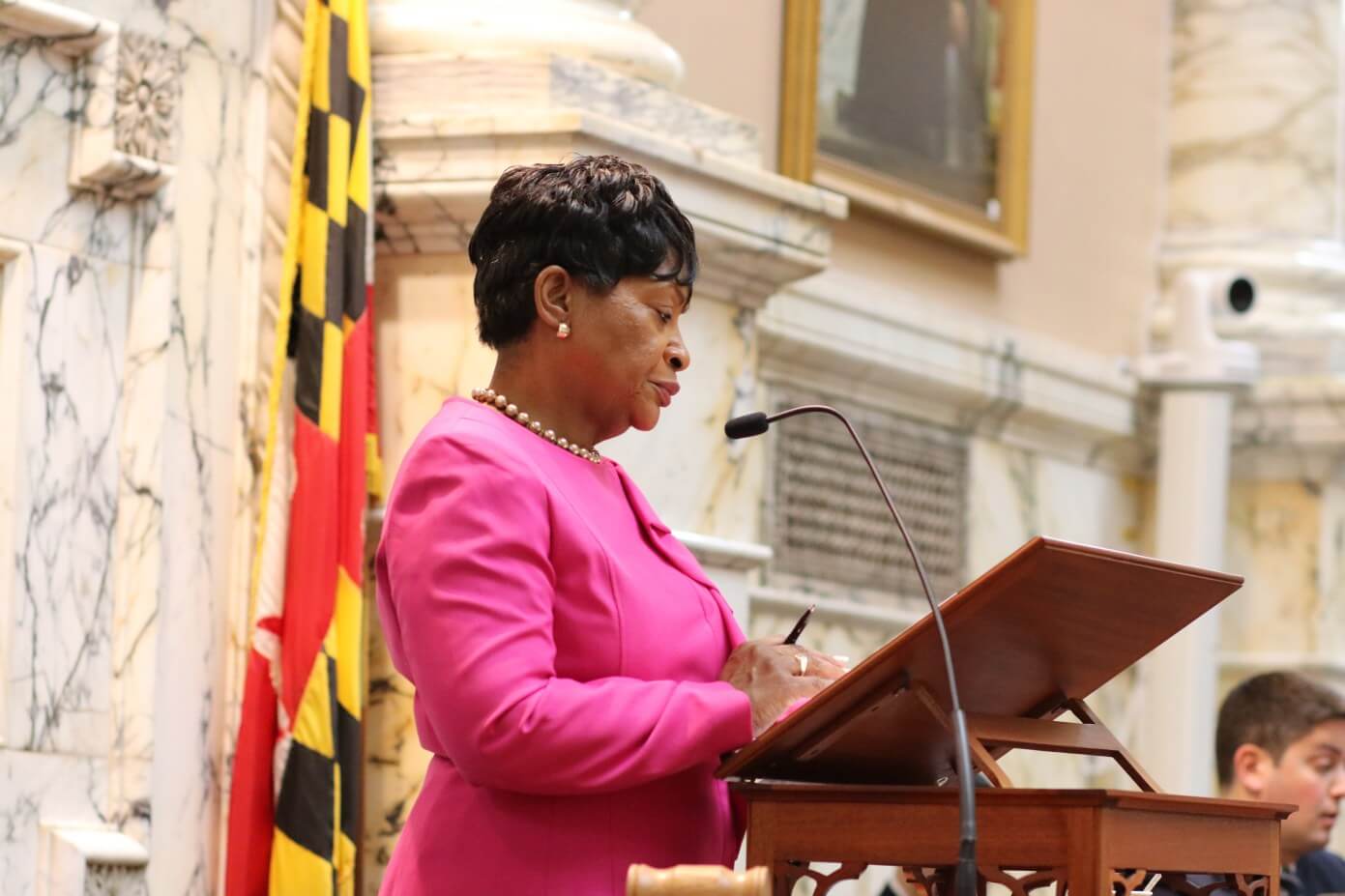Jones’ Policing Bill Moves Forward Intact Despite Attempts to Amend It

Despite relentless attempts to amend the bill, the House Police Reform and Accountability Act of 2021 advanced through the chamber Wednesday night virtually untouched. A final vote should come later this week.
Montgomery County Del. Gabriel Acevero was the only Democrat to try to alter the bill during the four-hour floor debate. Republicans proposed 17 amendments.
Acevero emphasized the desire expressed by police reform advocates for communities to have a tangible role in officer discipline.
“Could you speak to what in this bill addresses community oversight and control?” he asked House Judiciary Committee Vice Chair Vanessa E. Atterbeary (D-Howard), who served as floor leader for the bill, which was sponsored by Speaker Adrienne A. Jones (D-Baltimore County).
Atterbeary responded that the Judiciary Committee worked on amending the bill with community oversight and transparency in mind before it hit the House floor.
She gave an overview of the lifecycle of a misconduct complaint afforded under the bill, from the time it’s filed in a local jurisdiction’s police accountability board, to its probe by the independent investigative body, to the charging committee that determines if an officer should face disciplinary action and the trial board that would handle any appeals.
Under the bill, the accountability board, charging committee and trial board would require civilian participation.
“So there are three stages in this piece of legislation where civilians participate in the process,” Atterbeary explained.
Acevero pushed back, saying that there is a difference between civilian participation and community oversight.
Backed by the Maryland Coalition for Justice & Police Accountability, Acevero introduced an amendment to allow jurisdictions to adopt laws to create local civilian oversight boards, mirroring a measure that was stricken from Baltimore City Sen. Jill P. Carter’s bill to repeal and replace the Law Enforcement Officers’ Bill of Rights that passed out of the Senate last week.
“If we are trying to reimagine public safety, reimagining public safety looks like giving the community the control … and investigative and disciplinary power, which is what my amendment is calling for,” Acevero said.
MGA must support Del. @GabrielAcevero’s amendment to allow local jurisdictions to establish real external community oversight boards. Communities in Maryland have been advocating for this since the early 60’s and now is the time to act! #MDGA21 #MDPolitics
— MD Coalition for Justice & Police Accountability (@MDPoliceReform) March 10, 2021
Atterbeary urged the body to resist the amendment, noting its removal from the Senate bill.
The amendment failed on a voice vote.
Arguing from the House chamber annex, Acevero encountered a level of disrespect from his colleagues in the chamber, who talked through the explanation of his amendments, grumbled each time a new one was introduced, and laughed when they were rejected.
Acevero offered three other amendments Wednesday night. One sought to require the Attorney General and Maryland State Police to submit a report to the General Assembly about the extent of white nationalism in law enforcement agencies in the state; another would have ended qualified immunity for law enforcement officials in state courts; and the third would have removed police officers from public school campuses.
All of these also failed — the first two by voice vote and the third by a harsh roll call vote of 4-124.
‘Zero’ bipartisan support
Republicans attacked Jones’ omnibus police reform bill from all angles, attempting to amend everything from its use of force policy to the proposed makeup of the Maryland Police Training and Standards Commission.
Members of the House GOP Caucus stood strong in their opposition to the sweeping police reform during a news conference Wednesday afternoon.
House Minority Whip Kathy Szeliga (R-Baltimore County) said that the months of debate that developed the bill were “largely devoid of facts and reason,” and that the legislation had “zero” bipartisan support.
“Our caucus is more than willing to work to have productive, fact-based conversations about the state of policing in Maryland, and pass common-sense measures to improve it, some of which we’ve seen passed in the Senate,” Szeliga said at the news conference. “What we are not willing to do, and what the other side in the House seems to be obsessed with doing, is making police criminals while letting far too many of the real criminals walk free.”
All 17 amendments offered by Republicans failed Wednesday night, roughly along party lines. They included attempts to:
- Strike the 8 a.m. to 7 p.m. timeframe requirement to execute all search warrants (by a vote of 50-88);
- Lower the evidentiary standard to apply for a no-knock warrant from “clear and convincing evidence” to “a preponderance of the evidence” (41-98);
- Strike a portion of the bill requiring officers to wait 30 seconds after knocking on the door of a residence before entering when executing regular search warrants (44-91);
- Strike language that prohibits an officer from using force “unless the force is necessary force and proportional to taking into consideration the seriousness of the alleged crime” (43-92);
- Re-establish the requirement for evidence that officers knowingly and willfully intended to violate the use of force statute before they are criminally prosecuted (51-87);
- Require officers to act “objectively to use” reasonable alternatives to force rather than have “exhausted” all alternatives (53-82);
- Add “when time, circumstances, and safety allow” to the bill’s duty to intervene measure (43-89);
- Require officers to receive training on the U.S. Constitution and Bill of Rights (51-74);
- Re-establish prior cannabis use as a disqualifier when applying to be a police officer (42-88);
- Prohibit misconduct records relating to administrative or criminal misconduct investigations from public disclosure if officers were exonerated or the complaint was unfounded (47-80);
- Require civilian members of administrative charging committees to be U.S. citizens that have not been convicted or charged of a crime punishable by 90-days imprisonment (47-81);
- Order law enforcement officers to serve on the independent investigatory bodies afforded under the bill (50-82);
- Exempt cities under a federal consent decree from being required to participate in the independent investigative body measure of the bill (45-88); and
- Insert whistleblower protections into the bill (49-86).





 Creative Commons Attribution
Creative Commons Attribution